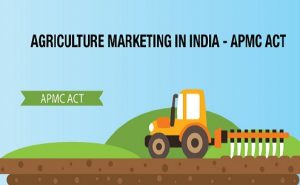Central Govt. has unveiled a draft model law ‘Agricultural Produce and Livestock Marketing (Promotion and Facilitating) Act (APLM), 2017’. This draft model seeks to liberalise the trade in agri-products and livestock and will thereby help in doubling farmers’ income by 2022. It was unveiled on April 25, 2017 following a meeting of state agriculture marketing ministers in New Delhi.
- The new model law has been drafted by a committee headed by Mr. Ashok Dalwai – Additional Secretary at the Agriculture Ministry. It replaces an earlier model law proposed by the centre in 2003 which the states were not keen to adopt.
Key provisions of Agricultural Produce and Livestock Marketing (Promotion and Facilitating) Act (APLM), 2017:
The new model law seeks to establish a regulated wholesale agri-market at a distance of every 80 km. To enable this, it has proposed to issue licences to new private players and traders who wish to set up a wholesale market. Even private market yards, warehouses and cold storages will be allowed to act as regulated markets.
- Only by paying unified single fee, farmer/trader will be able to transact in all such regulated agri-markets within the state. There will be no separate fees for individual markets.

- The new model law has also proposed specific limits on market fees and commission charges payable by a farmer.
- All regulatory powers, including the power to issue new licences will lie with the office of the director of agricultural marketing in the state.
Benefit for Farmers:
Currently farmers have to sell their produce at regulated Agriculture Produce Marketing Committee (APMC) mandis only.
- There are 6,746 such mandis, located at a distance of every 462 km. For transacting in every mandi, a separate fee is to be paid.
- From farmers’ viewpoint it is almost a monopolistic situation. Under the new model law, with more number of regulated wholesale agri-markets in the state and single access fee, farmers will have more avenues to sell their produce and get better prices.
- Agricultural marketing is a state subject as per Indian Constitution. Thus the new model law is not binding upon the State Governments.
- Currently the trade in agricultural produce is governed independently by State specific acts. The states can adopt the new model law either partially or fully.


